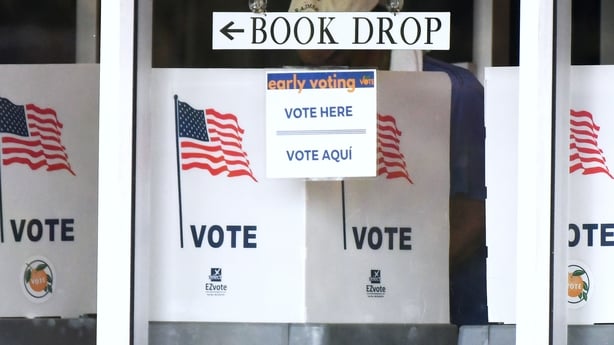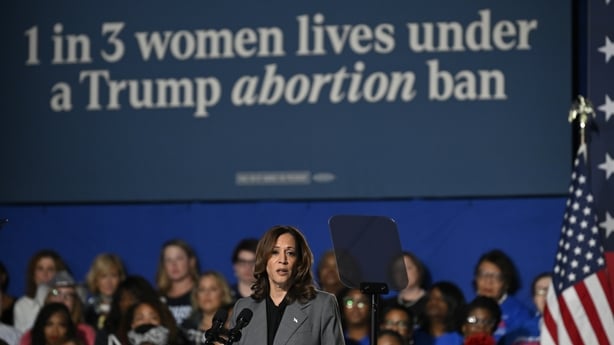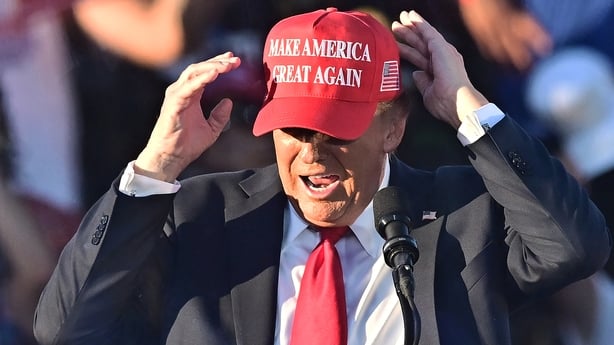Today is Pennsylvania Day – both candidates in the US Presidential election are holding rallies in this most prized of the seven swing states.
So important is Pennsylvania to the outcome of the Presidential election, that both candidates are holding a number of rallies here today.
Kamala Harris is dedicating her entire last day to a series of events in Scranton, Allentown, Reading, Pittsburgh and here in Philadelphia, where TV mogul Oprah Winfrey and musicians Lady Gaga and Ricky Martin will entertain the crowd outside the city's Museum of Art.
Donald Trump is also holding rallies in Pittsburgh and Reading, but will visit two other swing states - Raleigh-Durham in North Carolina - a state he has repeatedly visited - and finishing with a late night appearance in Grand Rapids Michigan, where he ended his previous two campaigns.
The vice-Presidential candidates are both holding campaign events in Michigan and Milwaukee, which along with Pennsylvania make up the so-called Blue Wall swing states, that most likely hold the keys to the White House for whoever wins them.
No doubt feeling the pressure to deliver (but hiding it well) is the Governor of Pennsylvania, Josh Shapiro, a Democrat.
An official surrogate for Kamala Harris (someone who makes media appearances to speak on behalf of a candidate), Mr Shapiro and Tim Walz were the final two choices for Ms Harris' vice president.
Mr Shapiro, because his popularity in the state, was considered useful in getting the most important swing state across the line, and it still is.
"Look, I feel really good," he told me at a canvass launch event in the Country Club Diner in North East Philly.
"I’d rather be us than them. Obviously, it's close, but it's always close here in Pennsylvania - the last two elections came down to a point or less. I'd rather be us than them.

"We got a better team on the floor, a far better floor captain in Kamala Harris than Donald Trump, and we're all working with common purpose to get this done".
The Commonwealth of Pennsylvania has 19 electoral college votes - more than any of the other swing states - and gives a big advantage to whoever wins here.
Jim Carville, the election guru and Democratic Party operative who guided Bill Clinton to the White House, famously described Pennsylvania as "two big cities with Alabama in between them".
By which he meant Pittsburg and Philadelphia were democratic party strongholds, while the rural rest of the state was deep red Republican.
With that kind of divide, and in the last few days of the campaign, when launching new policies or ideas is pointless – because more than 70 million people have already voted early, and the remainder have their minds made up – getting the vote out is all that matters for the two big parties.
Most politicos think an undecided voter at this stage of the game is someone who cannot decide whether to vote for the candidate they have chosen, or whether to stay at home and watch TV.
We need your consent to load this rte-player contentWe use rte-player to manage extra content that can set cookies on your device and collect data about your activity. Please review their details and accept them to load the content.Manage Preferences
So right now, in the dying hours of campaigning, it is all about getting the vote out – of not letting the TV or the video game console or the AR-15 that needs cleaning or anything else prevent a potential voter from becoming an actual voter.
Those big rallies are to keep up interest, not to change minds, to underline the importance of voting.
So too are the smaller actions that are the bedrock of political campaigning: knocking on doors, delivering leaflets, and direct engagement with voters.
Yesterday morning we went to Chester, a run-down former industrial city south west of Philadelphia.
In the car park of a union office a couple of busloads of volunteer canvassers were getting their riding instructions from campaign staff.
They had come into PA from Washington DC and New York, heeding appeals from the party to maximize the boots on the ground, to fight house to house for voters.
Nate and Jake, originally from Oregon and Massachusetts, had travelled up from DC to knock on doors in Chester.
Quite often they were speaking to a camera/doorbell.
During our brief time with them, only one door actually opened.
An African American man in a depressed area told them he was voting for Mr Trump.
Which I think tells us this race could well be every bit as close as the pollsters, analysts and politicians have been saying for months.
Chester is part of Congresswoman Mary Gay Scanlon’s fifth congressional district.
"My race is going great," she said, a reminder that this is a general election, and that every seat in the House of Representatives and one third of the US Senate and numerous state and local office holders are up for election tomorrow.
"But we're working up and down the ballot to make sure that we elect everyone from Vice President Harris and Tim Walz down through our state representatives in our state house and our state senate".
Okay, let's go straight to the top of that ballot. How is the presidential race looking right now in this district? I asked.
"This district is looking good. It's a Democratic district, but the issue in Pennsylvania is that it's so close across the board that we really want to make sure that everyone in our more Democratic areas gets out and votes, because we know that not every region is the same, so it's very much a game of inches here in Pennsylvania, and everybody's trying to grow turnout.
"Turn out is definitely the key at this point," she said.
"It doesn't seem to be a question of people being undecided between the two candidates, because I think there’s a very stark distinction between the two candidates, but it's whether people are undecided about whether to vote. So, we want to make sure they understand the stakes and understand how much their vote really matters".

What then of the issues she encounters on the doorsteps of suburban Philadelphia, which is often seen as the frontline between Democratic and Republican voting areas.
"The economy is always going to be first and foremost, how people are doing. Can they see their prospects for themselves and their children?
"Obviously, reproductive health is a huge issue for women, because we've seen some really ghastly outcomes from the overturning of Roe v Wade and the denial of health care to women across this country.
"The Republican conservative manifesto project 2025 has been something that my constituents have been asking about for months now. "It's a very, very right wing extremist kind of manifesto, which was prepared by Trump surrogates. And although he tried to distance himself from it, it's pretty clear that that's what will be guiding his administration, should he win.
"So it's been something that my constituents have been writing and calling about. We've just held a series of town halls about that".
The gender divide
There are reports of a male/female division among candidate preferences, with more women going for Harris and more men – especially young men – going for Trump? I ask whether this really is a thing?
"I think it is a real thing," she says.
"We've been seeing that since the last cycle, 2022, right after the Roe v Wade decision was overturned, we see a lot of houses where the man may be registered as a Republican, the woman may be registered as a Democrat, and they may be voting in different ways.
"Women tend to vote more regularly, (i.e. women tend to vote more than men, especially young men).
"So again, it's all about turnout".
Back at The Country Club Diner in north east Philadelphia, we meet Congressman Brendan Boyle.
He has arrived with the Mayor of Philadelphia, Cherelle Parker, who gives a rousing speech in which she decries efforts to divide people.
The enthusiasm is infections.
Representative Boyle says of Kamala Harris there is "tremendous enthusiasm", and the polls are showing that as well - that by some measures, there is actually greater enthusiasm now than there was in 2008 when Barack Obama was first elected.
It took a while to build up, but a lot of times in politics, peaking at the right moment is incredibly important.
"So I like to say, where would you rather be in this election that all the world is focusing on, than right here in Philadelphia, the city where American democracy was born?".

So what about Alabama versus Pittsburg and Philly? Things are going to go well for the Democrats in the big cities, but not so well in the rural parts.
"Well, you know, a one-point election as the last two presidential elections were, in this state, can come down to any demographic, to any county.
"Getting out the vote in Philadelphia is incredibly important. But last time flipping blue collar counties like Erie and North Hampton, they were crucial as well to Joe Biden's victory.
"So I believe that you got to chase voters where they are, whether it's right here in Northeast Philadelphia or seven hours away in northwestern Pennsylvania."
So how confident is he that Kamala Harris is going to win?
"I'm cautiously optimistic. I'm one of those. I'm crossing my fingers and crossing my toes, as I say it to you, so I never take anything for granted.
"You know, we have seen the polls miss before and underestimate Donald Trump's support, so even if, right now, as it shows that we have a small lead, I'm not resting on that until the polls close at 8pm on Tuesday night".
He too is seeing a clear divide between men and women in their choice of candidate.
"Over the last 30 years, there's always been a slight gender gap. Democrats tended to do better with women. Republicans tend to do better with men. But ever since the Dobbs decision in June of 2022 (Dobbs vs Jackson Women’s Health Organization) we are seeing a gender gap like we've never seen before.
"We saw it as soon as the Dobbs decision came down, there were two small special elections for Congress, one in a seat in Alaska, which was a Republican leaning seat, the Democrats picked up, and the other was in upstate New York, also Republican leaning seat, the Democrats also picked up. So ever since then, we have seen a gender gap like we've never seen it before, and that benefits Democrats".
'Very close'
Although the diner was chock full of raucous democrats and trade union members, there not just for the Harris Walz ticket, but also for local State House and Senate candidates Sean Dougherty and Jimmy Dillon, there was also a small knot of red shirted canvassers in the corner who turned out to be republicans canvassing for State Representative candidate Aizaz Gill.
"It's very tough being a Republican Philadelphia," he tells me. "Philadelphia is 89% Democrat, but the people that we have spoke to - we've knocked on 15,000 doors in our neighborhood over and over again. People are very receptive to us.
"I think it's going to be a 50/50, I think it's going to be very close.
"I think a lot of the elections in Philadelphia are going to be very close, all the way down to the State Senate race, down to the State Representative race.
"I think they're all at this point going to be a toss up".






